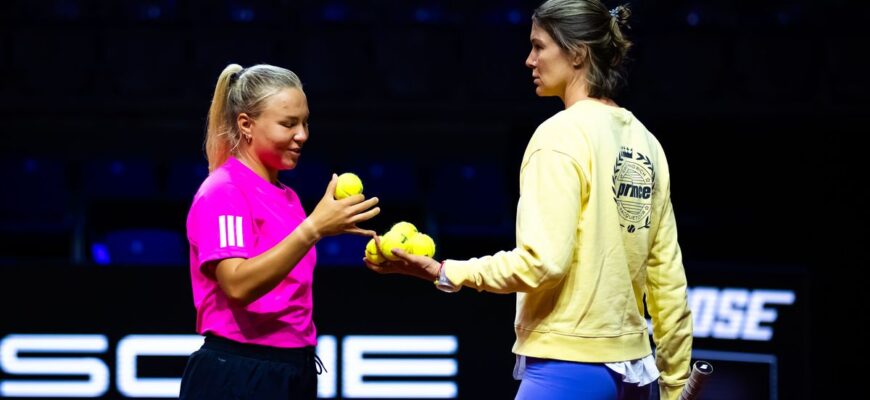Former WTA World No. 1 Dinara Safina knows that playing is much easier than watching from the sidelines. Despite this, she recently returned to top-level tennis, taking on a coaching role.
Safina might have questioned that decision during Diana Shnaider and Mirra Andreeva`s tense doubles match on Court 5 at the Mutua Madrid Open on Friday. The pair ultimately triumphed over Nicole Melichar-Martinez and Liudmila Samsonova in a close 12-10 match tie-break.
Watching from her seat, Safina was visibly anxious, twisting and grimacing. When asked if it felt like a heart attack, she replied, “Almost,” shaking her head. Shnaider agreed, “I can imagine that. I almost had one, too.”
Safina, known for her clay-court prowess, is now working with Shnaider, who recently turned 21, on the red dirt. Shnaider, ranked No. 13, secured a dominant 6-0, 6-0 win over Anastasija Sevastova in just 44 minutes on Saturday.
This was Shnaider`s first double-bagel victory on the WTA Tour, advancing her to a Round of 16 clash on Monday against either World No. 2 Iga Swiatek or No. 31 Linda Noskova.
The coaching partnership came about after Shnaider parted ways with her previous coach, Igor Andreev. Her mother, Yulia, seeking a new coach, consulted Anastasia Myskina, the 2004 French Open winner and close friend/colleague of Safina. Myskina recommended Safina, leading to Yulia contacting her.
Safina explained the timing, stating that requests to join Shnaider in Dubai were too sudden, and visa issues prevented her from coaching during the U.S. tournaments. She agreed to the clay-court season, adding that after discussing it with her family, “For me, it was the perfect timing.”
Shnaider expressed enjoyment of their practices and time spent together, highlighting Safina`s vast experience as a former top player as her greatest strength.
According to Shnaider, Safina focuses on building mental fortitude, managing emotions, and making strategic adjustments like ball placement, aggression, and taking opportunities at the net. Shnaider summarized the key takeaway as learning not to dwell on mistakes or negative emotions but instead to analyze, find a solution, and focus on the next point, avoiding self-criticism.
Safina noted that seeing tennis from a coaching perspective has been an interesting experience.
Safina candidly commented on the coaching dynamic, saying, “I don’t know if it helps her, doesn’t help — looks like sometimes it does, sometimes it doesn’t. Sometimes she listens, sometimes she doesn’t listen.”
When a reporter mentioned Shnaider`s age (21) and relative newness to the tour, Safina responded pointedly, “Not a kid, come on. We have to be honest. It’s an adult. Slowly, she has to grow up and become a woman to be a little more disciplined.”
Shnaider acknowledged the point, stating she always listens but sometimes needs time to implement Safina`s suggestions. She clarified she`s “never like, `Whatever,`” but finds it challenging to instantly change, comparing it to needing more than a simple “click.”
Safina`s playing career ended prematurely in 2011 at age 25 due to a chronic back injury.
When asked what she`s been doing since, she sighed and replied, “Actually, living life.”
Over the past 14 years, Safina has pursued various ventures. She earned a law degree, worked in player relations for tennis tournaments, served as an operations director for an IT company (which she disliked due to office hours), lived in New York, and coached Anhelina Kalinina.
For almost ten years, she faced a significant personal struggle. Safina revealed she battled binge eating disorder, leading to weight gain, depression, and difficulty finding her path. She described it as a long period of “ups and downs” before she slowly began to recover.
Her recovery process began around 2020, and now, smiling, she noted, “And now I’m here.”
Safina and her brother Marat were previously known as the only siblings to both reach World No. 1 status. Currently, both are coaching top-ranked players; Marat recently started working with Andrey Rublev.
The current coaching agreement covers the clay-court season. The future beyond Roland Garros will be discussed later. Safina stated, “We’ll see, It’s still to talk about.”
Shnaider expressed enthusiasm for the partnership, liking Safina`s perspective on her game and what she needs to improve. She anticipates discussing the future before or after Roland Garros, adding, “For me now I’m just enjoying, and I hope she is, too.”









